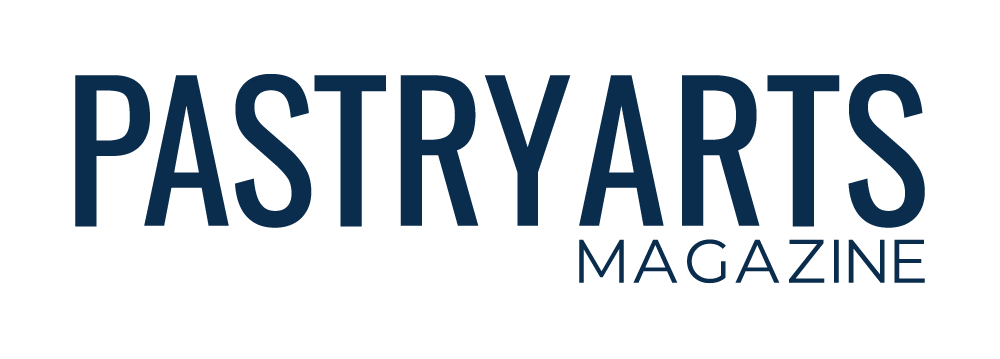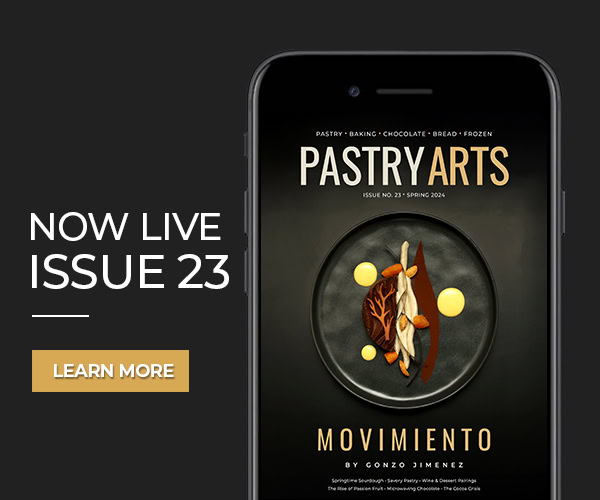(This article appeared in the Winter 2023 issue of Pastry Arts Magazine)
 A software engineer-turned-baker, Maurizio Leo is the founder of the award-winning sourdough website The Perfect Loaf (www.theperfectloaf.com). He grew up in an Italian household and spent summers visiting family in Italy and the back kitchen of his family’s Italian restaurant, learning the importance of making food – and dough – by hand. Since making his first sourdough loaf over a decade ago, Maurizio has been obsessed with adjusting the balance between yeast and bacteria, tinkering with dough strength and hydration, and exploring everything sourdough. He has just written his debut cookbook, The Perfect Loaf (Clarkson Potter, 2022), and there’s no doubt it will be the go-to guide to the art of sourdough for years to come. We caught up with Maurizo recently to get his thoughts on his career shift, upcoming sourdough trends and his new book.
A software engineer-turned-baker, Maurizio Leo is the founder of the award-winning sourdough website The Perfect Loaf (www.theperfectloaf.com). He grew up in an Italian household and spent summers visiting family in Italy and the back kitchen of his family’s Italian restaurant, learning the importance of making food – and dough – by hand. Since making his first sourdough loaf over a decade ago, Maurizio has been obsessed with adjusting the balance between yeast and bacteria, tinkering with dough strength and hydration, and exploring everything sourdough. He has just written his debut cookbook, The Perfect Loaf (Clarkson Potter, 2022), and there’s no doubt it will be the go-to guide to the art of sourdough for years to come. We caught up with Maurizo recently to get his thoughts on his career shift, upcoming sourdough trends and his new book.
When did you first get hooked on making sourdough bread?
In 2011, I was serendipitously given a book on sourdough baking. After reading through the process of creating a sourdough starter, balancing the forces of fermentation, and working with doughs daily to produce something healthy and delicious, I knew I would fall in deep. Since creating my first sourdough starter, I’ve baked in ever-increasing quantities and so much so these days I might as well be running a bakery from home.
You were a software engineer for over a decade before you decided to devote all your time to baking the perfect sourdough loaf and blogging about it. What were some of the early challenges you faced once you started your blog and baking adventure?
 It was scary to switch careers from engineering to baking – especially since I went through a master’s degree in computer science. But I made this change slowly over many years (and I still write software from time to time!), doing both types of work simultaneously. These days, though, I’d say I’m a full-time baker and a part-time, or occasional, software engineer. It’s strange saying that, but I’m not sure I’d want it any other way.
It was scary to switch careers from engineering to baking – especially since I went through a master’s degree in computer science. But I made this change slowly over many years (and I still write software from time to time!), doing both types of work simultaneously. These days, though, I’d say I’m a full-time baker and a part-time, or occasional, software engineer. It’s strange saying that, but I’m not sure I’d want it any other way.
When starting The Perfect Loaf website, it was sometimes tough sticking to it. There were many months when I was flooded with engineering work and needed more time to bake bread, test my guides and recipes, or write articles for other outlets. That didn’t stop me, though; I remember staying up and baking late into the night to ensure my formulas and articles were what I had intended. When something’s a passion for you, your good sense (and other commitments!) sometimes goes out the window.
Who were some of your early mentors, and how did they inspire you?
Since I’m primarily a home baker, my early mentors were through books: bakers like Jeffrey Hamelman, Ken Forkish, Chad Robertson, Peter Reinhart, and others were my mentors from afar. Early in my baking career, I read books like novels, scouring other baker’s approaches to bread, and tried to emulate their professional baking here in my kitchen. I’ve also been greatly influenced by bakers such as Dave Miller, who inspired me to work with freshly milled flour and more whole grains.
From there, I’ve taken a few professional-level courses from Jeffrey Hamelman, Jeff Yankellow, and Thomas Teffri-Chambelland. At each of these courses, I learned a diverse range of new techniques and approaches to bread making.
Early in my baking career, I read books like novels, scouring other baker’s approaches to bread, and tried to emulate their professional baking here in my kitchen.
Your dad had an Italian restaurant, so you were immersed in the world of the professional kitchen from an early age. Did this contribute to your obsession with sourdough?
Growing up (and later working) at my dad’s restaurant planted the seed for working with dough and baking. While his restaurant wasn’t a bakery, they made copious amounts of pizza, and watching him work with pizza dough daily – and later seeing the smiles and interactions with his customers – left a strong impression on me. That, coupled with the from-scratch cooking my Italian grandmother did at home, certainly was a source of my motivation to work with food –
but I think the combination of science, craft, and these early food memories got me into sourdough bread. It has it all!
.. as the years go on, I gravitate to using more whole grains – especially whole grain spelt – and freshly milled flour; it’s hard to deny the flavor each of these brings to my sourdough bread.
What are some bread baking trends that you think will become popular with sourdough bakers in the near future?
Trends with baking are hard to predict, but I find many bakers are experimenting with inclusions that are very unique. Whether it’s new spice combinations, dried fruit, or even dark chocolate, sourdough is a playground for endless possibilities and experimentation.
Personally, I’ve been working more and more with the tangzhong technique to bring more softness and better keeping qualities to my bread. In addition, as the years go on, I gravitate to using more whole grains – especially whole grain spelt – and freshly milled flour; it’s hard to deny the flavor each of these brings to my sourdough bread.
What are some characteristics that you think sourdough bakers – both amateurs and professionals – have in common?
I think many sourdough bakers have an innate drive for constant improvement. I like to use the word kaizen to describe my baking: continuous work at something with the desire to constantly improve the final bread and the process of creating it.
Tell us about your new book, and how it’s different from other bread books.
My idea for my cookbook was to be a very comprehensive look at sourdough bread making, but more than that, I designed it to be a companion for any baker in the kitchen. It begins with setting the foundation of sourdough fermentation and creating your starter. As a baker in the kitchen, it continues to grow with you as your baking proficiency expands and evolves. I wrote it to help any baker at any level, whether you’ve never baked a loaf of bread before or you’re a professional baker in a bakery.
My cookbook differs from others in just how comprehensive it is – no aspect of baking has been left out. But also, I wrote it in an approachable and, I hope, inspirational way!
I like to use the word kaizen to describe my baking: continuous work at something with the desire to constantly improve the final bread and the process of creating it.
What’s your idea of the perfect loaf of sourdough?
My idea of the perfect loaf changes year after year as my sourdough baking evolves and new avenues for discovery are taken. Because, really, there is no such thing as the perfect loaf; rather, it’s the ideal we strive toward as bakers. Whether the ideal is a loaf with a dark and crunchy crust that’s light in hand and strong-flavored or a simple pan loaf that comes together with little fuss – the target is constantly unwinding. And that’s part of the reason why baking is so wonderful.
At this moment in my baking, I’m looking for bread with a deeply-colored mahogany crust, a tender and evenly-open interior, and an upfront grain flavor punctuated by complex sour notes from long fermentation. I love working with freshly milled flour, and they tend to find their way into my formulas in varying percentages, which only adds to the flavor and nutrition.











You must be logged in to post a comment.